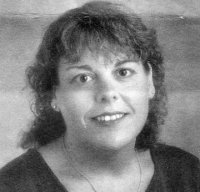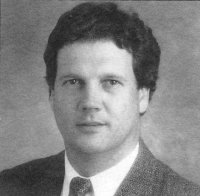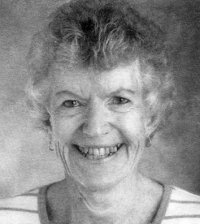Profiles
Faculty profile:
Jo Gielow
 |
|
Jo Gielow
|
Many people dream of finding a career for which they will be particularly
well suited, one which will be challenging, rewarding, and, if at all
possible, fun! Jo Gielow seems to have found one that fits her to a "T"
-- teaching English. As a child she enjoyed reading, writing poetry and
studying foreign languages. With a smile, Gielow said, "For me, studying
language is like playing!" So Teaching English to Speakers of other Languages
(TESL) seems to be a natural career choice for her. However, this was
not always her goal.
Gielow was born in La Salle, Illinois, and studied English, French, Spanish and even a little Latin and Greek in an etymology class in high school. Then she worked her way through junior college. During these years she would often wait tables all night long and then change her clothes and rush straight to class. Armed with her AA degree and State Scholar status, Gielow next attended Southern Illinois University at Carbondale and eventually received both her BA and MA degrees from that institution. Since she had always enjoyed language, Gielow started to prepare to be a high school English teacher, but a chance encounter with a Peace Corps volunteer who had spent time in Thailand introduced Gielow to the study of linguistics. She eventually won the chance to work with Dr. Pat Carrell (a pioneer in Schema theory) as a graduate fellow doing research on reading schemata. Gielow was happy with this direction and expected to become a full-time linguist and researcher; however, an unexpected turn of events altered her career path once more.
When her graduate fellow duties demanded teaching a class in ESL, Gielow discovered that she loved it! At last she had found a way to combine both loves: language and teaching. After receiving her MA in TESL, Gielow came to work at ELI in the summer of 1987 and eventually became a permanent faculty member. Gielow has played an important role in several areas, having served as the first tutoring center coordinator and a member of the ELI curriculum development team. In addition, Gielow contributed to the development of ELI's program for Limited English Proficiency (LEP) children, serving middle school LEP learners in the Christina School District for 11 years. Finally, Gielow holds the distinction of being one of the first ELI faculty members to have achieved the rank of assistant professor.
When her busy schedule allows, Gielow enjoys a variety of exercise and cultural activities. Besides gardening and swimming, she is an active folk dancer and member of the Arden Folk Guild. She particularly enjoys contra dance, named for the French word meaning "opposite," suggesting the arrangement of dancers in facing lines of men and women. This complex and lively dance has come to America in two forms via France and England, and Gielow recently fulfilled a long-standing dream by visiting both of these countries.
Gielow brings many talents to ELI. Her advice to students is this: "Don't be afraid to make mistakes! Language is inside your head. It's invisible to the outside world until you speak. When a mistake is made, the problem becomes apparent, and then we can help you to fix it. So mistakes are a good thing! They are a necessary part of the learning process."
Perhaps what she enjoys most, she says, is the satisfaction of seeing students using the skills they have learned to make progress and to achieve their goals.
Professional staff profile:
Chris Wolfe
" In Chris Wolfe's third floor office, the bookcase tells the story.
A set of dark green and maroon law treatises. A pair of painted wooden
Babushka dolls. A three-volume Constitution of Ukraine in the Cyrillic
alphabet. And a guidebook to Eastern Europe. These objects attest to how
Wolfe combines his interests in international travel and linguistics with
his legal training in his position as legal studies coordinator.
 |
|
Chris Wolfe
|
Wolfe's career, much like a good library, has been years in the making, however. A year on a merchant marine oil tanker after graduating from Newark High School first whetted his appetite for travel. At the University of Delaware, he majored in English and linguistics and studied German. He also took classes in Russian, but that wasn't his first choice.
"When I signed up for Swahili," Wolfe explained with a smile, "I was the only student. The professor told me he couldn't teach a class of one."
After graduating in 1978, he and wife Megan took off for a three-month biking trip around Europe. Their return, Wolfe said, brought them face to face with the "real world of work and tedium." A year and a half later, he was enrolled in the Delaware Law School (now Widener University). After taking the three-day Delaware Bar Exam -- which he calls "the hardest test of my life" -- Wolfe began his law career, first as a judicial law clerk and then as an attorney for a general practice law firm in Wilmington. Several years later he decided to make a career change.
"I discovered I really didn't like the practice of law -- the arguing, the stress." Wolfe also did not like the long hours away from his family, which today includes sons Ben, 15, Stefan, 12 and Jesse, 8. As an undergraduate, he had tutored for ELI as part of an independent study linguistics course, when it was still part of the university's Writing Center. He began tutoring again part-time.
"In a sense I returned to my first love," Wolfe said, "language and international education." He came aboard full-time as ELI's orientation coordinator in 1990. Since then, Wolfe has spent almost 10 years and a number of "working vacations" building his post and beam house in Kemblesville, Pennsylvania. He has served as Cub Scout leader for one of the largest packs--140 boys--in the country, and as a lay leader for his church, where he plays the guitar and sings in the choir.
And he has developed ELI's Legal Studies Program, which he inaugurated in 1994. Today the program includes, in addition to the original American Law and Legal English Institute, both the Community Connections program and, most recently, the Women in Law program for Ukrainian legal professionals.
Wolfe assumed his current position in 1995. "Someone asked me recently what my dream job was," Wolfe said, smiling. "At this point in my life, I think I've got it."
Tutor profile:
Olive Yazid
 |
|
Olive Yazid
|
Once in a while you hear an adventurous tale that is simply amazing. Olive
Yazid's story is just that.
Growing up in cosmopolitan New York City, Yazid had always had a deep interest in traveling. She decided on a career in journalism, eventually taking a job at the Arab information center. In that position, she had the rare opportunity of interviewing several Arab personalities at the United Nations. One of these was an Algerian named M'hammed Yazid, whom she married. After their marriage, Yazid and her husband lived in Tunisia until 1962. The couple then moved to Algeria, where they lived with their extended family in a typical Arab home environment. Yazid fondly remembers the two-story house with a center courtyard full of orange trees and jasmine bushes.
In 1971, Yazid's husband became an ambassador to Lebanon, so the family relocated to Beirut. However, due to the civil unrest in Lebanon, Yazid and the children could not stay in Beirut, so the family returned to Algeria. After the children were older, Yazid began teaching English in Algiers to foreign students at the American Language Institute, a job which she thoroughly enjoyed.
Then, in 1994, because of Algeria's internal struggles and her husband's fear for her safety, Yazid moved back to the States, to be joined by her three children (two daughters and a son) and grandchildren, and began tutoring full-time at ELI's tutoring center. Although the family is in the States, Yazid's husband has continued his diplomacy work in Algeria.
While at ELI, Yazid has gained an excellent reputation as a fine tutor. Although she specializes in teaching grammar, she also tutors business professionals and serves in supportive roles for special groups from Arab countries, such as the United Arab Emirates. Her proficiency in French and her understanding of the Arab culture are a tremendous benefit to the ELI program.
Because of her unique life experience, Yazid can understand what ELI students go through. Having been in similar circumstances, she can effectively help students adjust to the culture and can also encourage them when they encounter the frustrations of learning a second language. What Yazid loves most about her job at ELI is her opportunity to meet internationals. "The job is nice at this time in my life," she says with a smile. "I feel lucky to have the chance to meet so many lovely people."
| Return to Table of Contents |